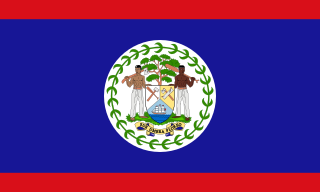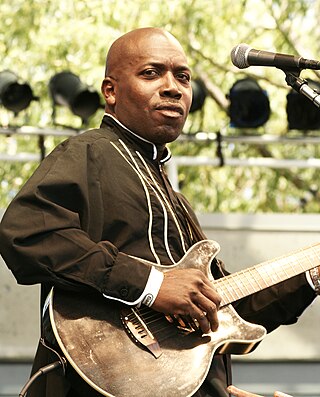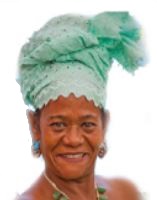
Belize is a country on the north-eastern coast of Central America. It is bordered by Mexico to the north, the Caribbean Sea to the east, and Guatemala to the west and south. It also shares a water boundary with Honduras to the southeast.

Dangriga, formerly known as Stann Creek Town, is a town in southern Belize, located on the Caribbean coast at the mouth of the North Stann Creek River. It is the capital of Belize's Stann Creek District. Dangriga is served by the Dangriga Airport. Commonly known as the "culture capital of Belize" due to its influence on punta music and other forms of Garifuna culture, Dangriga is the largest settlement in southern Belize.

Punta Gorda, known locally as P.G., is the capital and largest town of Toledo District in southern Belize. Punta Gorda is the southernmost sizable town in the nation, with a population of about 5,000 people. Although the town bears a Spanish name, its inhabitants are mostly Kriol/English-speaking and are primarily of Garifuna, East Indian, Kriol, and Maya descent.

The music of Belize has a mix of Creole, Mestizo, Garìfuna, Mayan and European influences.
Garifuna music is an ethnic music and dance with African, Arawak, and Kalinago elements, originating with the Afro-Indigenous Garifuna people from Central America and Saint Vincent and the Grenadines. In 2001, Garifuna music, dance, and language were collectively proclaimed as a Masterpiece of the Oral and Intangible Heritage of Humanity by UNESCO.

Punta is an Afro-indigenous dance and cultural music of the Garifuna originating prior to their exile to Roatan from the Caribbean island of Saint Vincent And The Grenadines. Which is also known as Yurumei. It has African and Arawak elements which are also the characteristics of the Garifuna language. Punta is the best-known traditional dance belonging to the Garifuna community. It is also known as banguity or bunda.

Andy Vivian Palacio was a Belizean punta musician and government official. He was also a leading activist for the Garifuna people and their culture.
Paul Nabor, born Alfonso Palacio, was a Garifuna singer and musician from Punta Gorda, Belize. He is often credited with popularizing paranda, a style of traditional Garifuna music, and is considered to have been one of the most talented musicians of the genre.
Wilfred Peters (Sr.) MBE, better known as Mista Peetaz, was and will always be the King of Brukdown Music in Belize. He was a pioneer of the music of Belize's Creole (Kriol) people called Brukdown or Brukdong. His favourite instrument was the accordion and for that he can also be remembered as a Belizean accordionist. He was also a band leader and toured Europe and North America with his band, the Boom & Chime Band, which is also known as Mista Peetaz Boom and Chime Band. Mr. Peters was also awarded an MBE by Queen Elizabeth in 1997 for his cultural contributions to the development of music.

Belizean Creole is an English-based creole language spoken by the Belizean Creole people. It is closely related to Miskito Coastal Creole, San Andrés-Providencia Creole, and Jamaican Patois.
Belizean Creoles, also known as Kriols, are a Creole ethnic group native to Belize.

The culture of Belize is a mix of influences and people from Kriol, Maya, East Indian, Garinagu, Mestizo, Mennonites who are of German descent, with many other cultures from Chinese to Lebanese. It is a unique blend that emerged through the country's long and occasionally violent history.
Delvin "Pen" Cayetano is a Belizean artist and musician.

Belizeans are people associated with the country of Belize through citizenship or descent. Belize is a multiethnic country with residents of Ethnic groups of Amerindian, African, European, Asian and Middle-eastern descent or mixed race with any combination of those groups.
The Lebeha Drumming Center was established in 2002 by Jabbar Lambey and Dorothy Pettersen, in Hopkins, Belize. Hopkins is a small coastal Garifuna community in the Stann Creek District of southern Belize. The center exists with the goals of keeping Garifuna music alive, passing traditional music along to young people in the community, and sharing music with visitors to Hopkins. The center’s focus is on traditional percussion music, though guitars have been donated and are also played.

Paranda is both a Garifuna rhythm and music with Arawak and African elements which utilizes rhythmic ostinatos in duple meter. Similar to punta, the paranda is a slower rhythm than punta. Paranda mainly focuses on the struggles that occurs in the Garifuna community. and reflects Spanish influences. Traditionally, the guitar is played in paranda and not in punta. and its melodies are soulful lamentations.

Leela VernonMBE was a Belizean cultural icon noted for her contributions to preserving Creole culture in the country. She was awarded the title "Queen of Brukdown", received the Order of the British Empire for promoting Creole culture and music, and was named the Brukdown Artist of the Year in 2004. She was honored as National Hero in 2016 by the National Institute of Culture and History.







